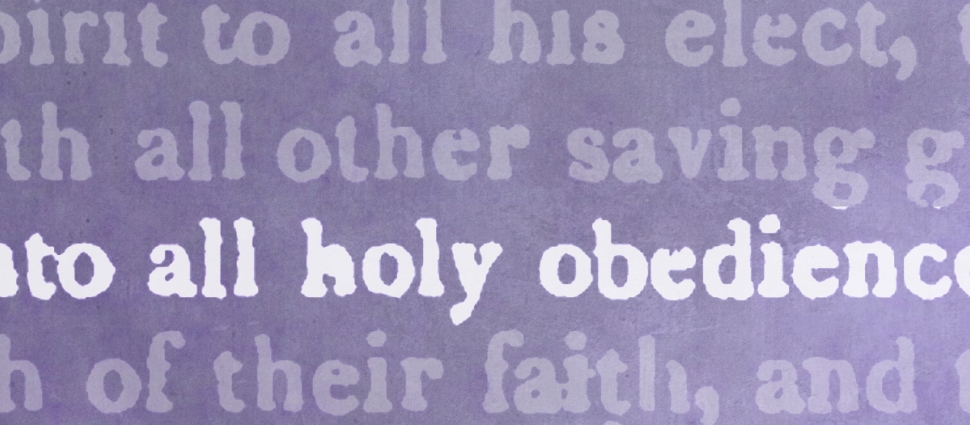In Defense of a Faithful Minister

One of the reasons the Puritans wrote a number of polemical works pertaining to sanctification, particularly with respect to law, good works and salvation, was to defend faithful ministers and churches. That reason remains true today and I want to take the opportunity to say a few words in defense of PCA pastor Kevin DeYoung. Pastor DeYoung was recently criticized for teaching that good works are necessary for salvation as a means. Although a number of people took umbrage at this view, it is thoroughly orthodox and is found among the Puritans and even the Westminster Standards.
E.F. Kevan, in his fine study on Puritan theology, rightly noted that “obedience to the Law was often referred to by the Puritans as the way to salvation.” In fact, the phrase “way to salvation” made its way into the Westminster Standards. The answer to question 32 of the Larger Catechism says that all holy obedience is the way God has appointed his elect to salvation. To say that holy obedience is the “way to salvation” is to say that it is a means. For example, David Clarkson said that obedience is necessary because it is “the means or way to salvation, without which it cannot be attained.” Thus, the Westminster Standards teach that good works are a means to salvation.
Since this is the case, why do some Reformed people vigorously object to this teaching? Let me suggest two reasons. One reason is that it is considered legalistic. R. Scott Clark says that if you view good works as a means of salvation—or what he likes to refer to as “through” or “instrument”—then Christ’s saving work is cut in half and he is reduced “to a mere facilitator, as if he said on the cross: ‘I have done my part, now you do yours.’” This argument is a non sequitur. It does not follow that what we do with respect to salvation necessarily impinges upon or diminishes Christ’s work of salvation. Certainly, if our good works form in part or in whole the ground of our salvation then they would take away from the work of Christ. But that is not what “means” mean. The means of salvation is distinct from the ground of salvation. We see this to be the case with respect to faith. Faith is the means of our justification. We need to believe in order to be justified. But that doesn’t mean that our faith is the ground of our justification. Therefore, if we were to argue that good works as a means of salvation impinges upon the work of Christ, then we would be required to make the same argument with respect to faith. If we need to believe in order to be justified, even if only as a means, then Christ is only half a savior. Interestingly enough, there were some people who did bite this bullet and argued that justification must precede faith in order to protect the gospel from salvation by works. The Puritans, however, rightly rejected this argument and said that it conflates means and ground, or if you will, redemption accomplished and redemption applied.
The second reason for rejecting good works as a means of salvation is because the Reformed tradition is interpreted through the wrong paradigm. This paradigm, as articulated by R. Scott Clark, says that there are three ways we can look at the role of good works: is (to be); through (instrument) and because (ground). Clearly, good works can’t be the ground of salvation. They also can’t be a means because, according to this paradigm, the Reformed confessions teach that faith is the only means or instrument of salvation (justification, sanctification, and glorification). That leaves the one remaining category to place the role of good works, namely, “is (to be).” It is the case that believers do good works. They are merely the fruit and evidence of salvation. Nothing more.
The problem is that this bumps up against the teaching of the Westminster Standards. As we have already noted, the phrase “way to salvation” indicates that obedience is a means and thus cannot be restricted to Clark’s category of “is (to be).” Faith, therefore, is not the only means of salvation. It is the only instrumental means of justification, but it is not the sole means of salvation, which is broader than justification. As Westminster divine Thomas Gataker said, “although unto justification nothing but faith is required…yet there is more than faith required unto salvation.” The Reformed distinction between title and possession, which I have explained elsewhere, is important here because it explains how faith and good works can both be a means of salvation without conflating them. Faith is a necessary means for the title to salvation and good works are a necessary means for the possession of salvation.
Pastor Kevin DeYoung did not venture outside the bounds of Reformed orthodoxy when he taught that good works are necessary for salvation as a means. The Puritans and the Westminster Standards teach the same view.
D. Patrick Ramsey (@DPatrickRamsey) is pastor of Nashua Orthodox Presbyterian Church in Edinburg, Pennsylvania. He is a co-author (with Joel Beeke) of An Analysis of Herman Witsius's The Economy of the Covenants and author of A Portrait of Christ.
Related Links
Grace Worth Fighting For by Danny Hyde
The Gospel Pure and Simple (Audio Disk Set | MP3 Disk Set | MP3 Download Set)
The Gospel: What, Why, and How? (Audio Disk Set | MP3 Disk Set | MP3 Download Set)
Antinomianism (Print Booket | PDF Download)





